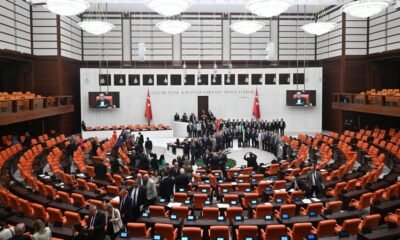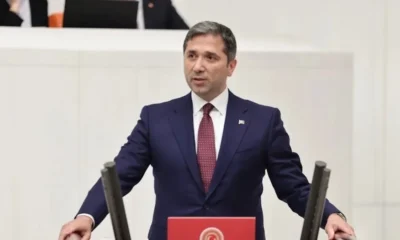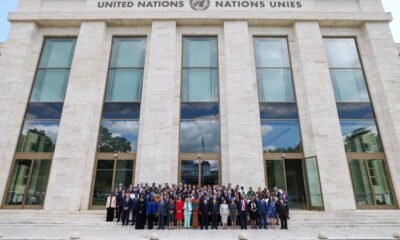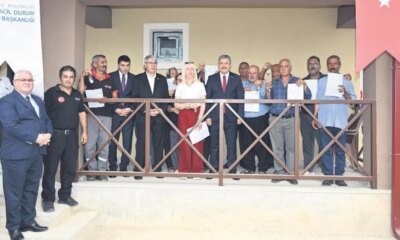Economy
White House defends firing of jobs data official, critics mount
White House economic advisers defended on Sunday the move of President Donald Trump to fire the head of the Bureau of Labor Statistics (BLS), pushing back against criticism that surprise action could undermine confidence in official U.S. economic data.
Later on Sunday, Trump again criticized BLS Commissioner Erika McEntarfer, without providing evidence of wrongdoing and said he would name a new BLS commissioner in the next three or four days.
U.S. Trade Representative Jamieson Greer told CBS that Trump had “real concerns” about the BLS data, while Kevin Hassett, director of the National Economic Council, said the president “is right to call for new leadership.”
Hassett said on Fox News Sunday that the main concern was Friday’s BLS report, which showed net downward revisions indicating that 258,000 fewer jobs had been created in May and June than previously reported.
Trump accused McEntarfer of faking the jobs numbers, without providing any evidence of data manipulation. The BLS compiles the closely watched employment report as well as consumer and producer price data.
The BLS gave no reason for the revised data but noted “monthly revisions result from additional reports received from businesses and government agencies since the last published estimates and from the recalculation of seasonal factors.”
McEntarfer responded to her abrupt dismissal on Friday in a post on the Bluesky social media platform, saying it was “the honor of her life” to serve as BLS commissioner and praising the civil servants who work there.
McEntarfer’s firing added to growing concerns about the quality of U.S. economic data and came on the heels of a raft of new tariffs on dozens of trading partners, sending global stock markets tumbling as Trump presses ahead with plans to reorder the global economy.
Investors are also watching the impact of the surprise resignation of Federal Reserve (Fed) Governor Adriana Kugler, which has opened a spot on the central bank’s powerful board and could shake up what was already a fractious succession process for Fed leadership amid complex relations with the Trump administration.
Trump said on Sunday he would announce a candidate to fill the open Fed position within the next couple of days.
Revisions are common
In an interview with CBS’s “Face the Nation,” Greer acknowledged there were always revisions of job numbers, “but sometimes you see these revisions go in really extreme ways.”
Brian Moynihan, CEO of Bank of America, stated that significant revisions to economic data could erode public confidence and that government officials should develop methods to enhance data quality.
“They can get this data, I think, other ways and I think that’s where the focus ought to be: how do we get the data to be more resilient and more predictable and more understandable?” he said on CBS. “Because what bounces around is restatements … that creates doubt about it.”
Critics, including former leaders of the BLS, slammed Trump’s move and called on Congress to investigate McEntarfer’s removal, arguing that it would erode trust in a respected agency.
“It undermines credibility,” said William Beach, a former BLS commissioner and co-chair of the group Friends of the BLS.
“There is no way for a commissioner to rig the jobs numbers,” he said. “Every year, we’ve revised the numbers. When I was commissioner, we had a 500,000 job revision during President Trump’s first term,” he said on CNN’s “State of the Union.”
Former Treasury Secretary Larry Summers, who worked in both the Clinton and Obama administrations, also criticized McEntarfer’s firing.
“This is a preposterous charge. These numbers are put together by teams of literally hundreds of people following detailed procedures that are in manuals,” Summers said on ABC’s “This Week.”
Large revision
The BLS surveys 121,000 employers – businesses and government agencies – each month, seeking their total payroll employment during the week in which the 12th day of the month falls. The response rate has fallen sharply since the COVID-19 pandemic, from 80.3% in October 2020 to about 67.1% in July.
Knowing that, BLS allows late-arriving employer submissions and revisions to earlier submissions to be taken into account over the next two months.
That means each month’s initial estimate of employment for the immediately preceding month also contains revisions to the two months before that.
The revisions in Friday’s report were large by historic standards. The downward revision of 125,000 jobs for May was the largest between a second estimate and a third estimate since a 492,000 reduction for March 2020. That was the largest ever and was reported in June 2020 for the May 2020 payrolls report.
Economy
Türkiye’s inflation cools to nearly 4-year low in July
Inflation in Türkiye dropped more than expected in July to reach the lowest level in almost four years, according to data on Monday that officials say reinforces official forecasts that price growth will slow further by year-end.
Consumer price inflation softened to 33.52% from 35.05% in June, the Turkish Statistical Institute (TurkStat) said. That was the lowest rate since November 2021, when prices had risen 21.31%. The rate was forecast to slow to 34.05%.
“Inflation is at the lowest level in 44 months,” Treasury and Finance Minister Mehmet Şimşek said, adding that the rate had dropped by 28.3 percentage points in the past 12 months.
Şimşek said that the disinflation is in line with targets and that year-end inflation will be within the central bank’s forecast range.
Month-over-month, inflation was 2.06%, driven by what Şimşek said were temporary and seasonal factors. In June, the monthly consumer price index was 1.37%.
The annual price growth in food and nonalcoholic beverages eased to 27.95% from 30.2%. Similarly, price growth in housing and utilities moderated to 62.01% from 65.54%.
Alongside housing, the yearly surge in prices was led by education, with 75.5%, and health, with 37.49%.
The lowest rates were posted in clothing and footwear with a 10.67% increase, communications at 19.62% and transport at 26.57%.
For the first time in over three years, service inflation fell below 50%, Şimşek said in a post on the social media platform X.
“The decline in inflation will enhance predictability, contributing to further improvement in domestic financial conditions and the investment climate,” he noted.
“We will continue to resolutely implement our program to achieve lasting price stability, our primary priority.”
More than a week ago, the Turkish central bank cut its key policy rate by 300 basis points and relaunched an easing cycle, while saying that leading indicators suggested a temporary rise in monthly inflation in July due to month-specific factors.
A midyear hike in fuel and tobacco prices, as well as a rise in natural gas prices, had been expected to drive monthly inflation.
Transport prices rose 2.89% month-over-month and alcoholic drinks and tobacco prices rose 5.69%, the data showed. Housing prices were up 5.78%.
Cevdet Yılmaz, the Turkish vice president, said the decline in annual inflation continues to be “significant.”
Inflation has dropped by approximately 42 percentage points since it peaked at more than 75% in May last year.
“This outlook demonstrates the effectiveness of our program and that our policies have restored balance to the economy,” Yılmaz wrote on X.
The central bank’s year-end inflation midpoint estimate currently stands at 24%, in a forecast range of 19% to 29%.
With strong coordination, structural transformation, determined implementation and continued predictability in the economy, Yılmaz said Türkiye aims to reduce inflation to the 20% range by the end of the year and permanently increase the well-being of the nation within price stability.
“We will continue to pursue balanced growth within stability, increase employment, and boost exports through investments that enhance value added and productivity,” he added.
Another report from the statistical office on Monday showed that producer price inflation eased slightly to 24.19% in July from 24.45% a month ago.
Prices of mining and quarrying climbed 28.3%, and manufacturing reported a 24.02% rise.
Producer prices of electricity, gas, steam and air conditioning grew 22.1% and surged 55.74% for water supply.
Month-over-month, producer prices moved up 1.73% after rising 2.46% in the prior month.
Economy
Italian regulator slaps Shein with nearly $1.2M greenwashing fine
Italy’s competition authority (AGCM) slapped a 1-million-euro ($1.16-million) fine on Chinese online fast fashion retailer Shein on Monday, arguing it misled customers about the environmental impact of its products.
It is Shein’s second financial sanction by a European competition authority in less than a month, following a 40 million euro fine by France on July 3 for offering fake discounts and making misleading environmental claims.
The Italian fine was imposed on Infinite Styles Services Co. Limited, a Dublin-based company that operates Shein’s website in Europe, following an investigation by AGCM launched last September.
In a statement, Shein said it has cooperated fully with AGCM and took immediate action to address the concerns raised.
AGCM said the environmental sustainability and social responsibility messages on Shein’s website “were sometimes vague, generic and/or overly emphatic and in other cases omitted and misleading.”
Shein’s claims on circular system design and product recyclability “were found to be false or at the very least confusing,” and the green credentials of its ‘evoluSHEIN by design’ collection were overstated, the regulator said.
Shein promotes the ‘evoluSHEIN by design’ collection as clothes made using more sustainable and responsible manufacturing.
AGCM stated that consumers could be misled into thinking that the collection was made from fully recyclable materials, “a fact that, considering the fibres used and currently existing recycling systems, is untrue.”
Shein, in its statement, said: “We have strengthened our internal review processes and improved our website to ensure that all environmental claims are clear, verifiable and compliant with regulations.”
AGCM also took issue with Shein’s “vague and generic” commitments to reduce greenhouse gas emissions by 25% by 2030 and to achieve net zero by 2050, noting that Shein’s emissions increased in 2023 and 2024.
The Italian regulator said its overall assessment was influenced by an “increased duty of care” falling on Shein “because it operates in a highly polluting sector and with highly polluting methods.”
AGCM is responsible for consumer protection as well as competition.
Economy
Swiss luxury watchmakers slip after Trump tariff blow
Shares in Swiss luxury watchmakers, including Richemont and Swatch, were volatile in early trade on Monday, underscoring the challenge the industry faces after U.S. President Donald Trump imposed a steep 39% tariff on Switzerland.
The sector, which exported watches worth 26 billion Swiss francs ($32.79 billion) in 2024, is already under pressure from a stronger franc and falling global demand.
Watch exports are on track to hit their lowest levels since the COVID-19 pandemic in 2020.
Shares in Richemont and Swatch were both down 0.8% at 08:25 a.m. GMT, paring back losses after earlier falling as much as 3.4% and 5%, respectively.
Monday was the first day of trading following the U.S. tariff announcement, as markets were closed on Friday for the Swiss National Day.
“The impact of the U.S. tariffs, if they stay at 39%, could be devastating for numerous brands in Switzerland,” said Jean-Philippe Bertschy, an analyst at Vontobel.
“We expect a strong negative impact for watches in the entry- to mid-price segments,” he said.
The U.S. is Switzerland’s leading foreign market for watches, accounting for 16.8% of exports worth about 4.4 billion francs ($5.45 billion), according to the Federation of the Swiss Watch Industry.
Shahzaib Khan, who runs a business exporting Swiss luxury watches, said many brands would not be able to deal with the 39% tariff rate.
“I suspect … there won’t be any goods being shipped to the U.S. until the situation clears,” he said.
While Richemont generated 32% of its full-year 2025 sales in the watches category, its exposure to the U.S. market should be just below 10% of overall sales, analysts at Jefferies said.
Swatch, meanwhile, generated 18% of its 2024 sales in the U.S., with its CEO saying the company had raised prices by 5% following the first tariffs announcement in April.
Economy
Inflation in Türkiye falls to 33.5% in July
Inflation in Türkiye dropped further to nearly 33.5% in July, below market expectations, continuing a downward trend and hitting almost a four-year low, official data showed on Monday.
Consumer price index (CPI) advanced 33.52% year-over-year in July, down from 35.05% in June, Turkish Statistical Institute (TurkStat) said. That was less than the market expectation of around 34%.
The July rate is the lowest since November 2021, when the rate stood at 21.31%.
Monthly prices increased by 2.06%, according to TurkStat data.
The yearly surge in prices was led by education, with 75.5%, housing with 62.01%, and health with 37.49%, as per data.
The lowest rates were posted in clothing and footwear with a 10.67% increase, communications at 19.62%, and transport at 26.57%.
The Turkish central bank lowered interest rates by 300 basis points to 43% last month.
Economy
Turkish monthly exports hit $25B mark for 1st time in July
Türkiye’s monthly exports achieved a new historic peak by hitting the $25 billion mark for the first time, according to a top official on Saturday.
Turkish outbound shipments in July surged 11% compared to the year earlier, Trade Minister Ömer Bolat told an event in northern Samsun province, announcing the preliminary data.
He recalled that the value of shipments stood at $22.5 billion in July of last year and drew attention to the fact that an additional $2.5 billion was added to exports when comparing the same month in 2024.
“We broke the highest monthly goods export record in our history in July. Consequently, we broke the highest export record for July in our history and as of July, we reached the highest total goods export figure in our history for the past year,” Bolat said.
“Another encouraging development: a slowdown in the rate of monthly import growth was achieved and the monthly foreign trade deficit in July narrowed significantly compared to the same month of the previous year and compared to June,” he added.
At the same time, he noted that the export-to-import coverage ratio also improved.
“This is what we call a ‘legendary month,’ six major achievements in one. We reached an all-time high in monthly exports at $25 billion, up from $22.5 billion in July last year, an increase of $2.5 billion, or 11%,” the minister said.
Bolat said exports in July increased by $4.5 billion compared to June, adding that the next target is to reach $26 billion in monthly exports.
“Our extraordinary efforts are reinforcing the process of rebalancing and stabilizing our economy,” he emphasized.
Previously, the monthly record in exports was achieved in May this year with $24.8 billion.
He also informed that the foreign trade deficit dropped to $6.4 billion last month, down 12% from $7.3 billion in July 2024, marking the lowest deficit in the past nine months.
Progress despite conflicts
Moreover, when examining January-July exports, he stated that they reached $156.4 billion, representing a 5.2% year-over-year increase.
He said that recent global conflicts, ranging from trade wars and tariff disputes, have caused sharp disruptions in global trade, growth, and commodity prices, including those of energy and gold.
Despite regional instability, Bolat said that under the leadership of President Recep Tayyip Erdoğan, “Türkiye continues its strong rise as a pillar of stability in the economy, foreign policy, defense, transportation and energy.”
He said Türkiye continues its trade diplomacy through multilateral, bilateral, regional and global agreements.
He noted positive progress with the European Commission, saying that 14 trade barriers have been removed, with nine to 10 remaining.
Emphasizing the goal to modernize the Customs Union, Bolat recalled that as a result of constructive talks, a directive was issued to grant longer-term visas to Turkish citizens who have previously traveled to the EU and returned regularly.
Looking at sectors, automotive continued its leadership with $3.8 billion in exports in July. Following automotive were chemicals with $3.4 billion, ready-made clothing with $1.58 billion, electrical and electronics with $1.57 billion and steel with $1.4 billion.
With $3.4 billion in exports last month, the chemicals sector had its best performance yet, with its total shipments from January through July surpassing $19 billion, according to a report by Anadolu Agency (AA).
The head of Turkish Exporters Assembly (TIM), Mustafa Gültepe, in his assessment, noted that almost all of the $2.5 billion increase in exports in July was due to parity with the automotive and chemical sectors.
“We’re not complaining, but for consistent and sustainable growth, we need to include all our sectors in the game,” he commented.
Economy
Türkiye-UK trade deal could serve as global ‘example’: Envoy
A planned update to the free trade agreement (FTA) between the U.K. and Türkiye would serve as “a great example” for modern trade deals, according to the British consul general in Istanbul, Kenan Poleo.
The first round of negotiations on the updated agreement concluded positively, covering areas such as goods trade and sustainability, said Poleo, who also serves as the U.K.’s trade commissioner for Eastern Europe and Central Asia.
“The most exciting thing about this new free trade agreement is (that it is) an opportunity for the U.K. and Türkiye to set a great example for the whole world around what a modern free trade agreement between two important partners looks like,” Poleo said in a recent interview with Anadolu Agency (AA).
The next round of negotiations is expected later this year and will focus on developing a road map for expanded cooperation, particularly in services and innovation-driven sectors.
Trade between the two countries currently exceeds 27 billion pounds (approximately $36 billion), making Türkiye one of the U.K.’s largest trading partners, he said.
“Given the depth of our relationship, really, the sky’s the limit,” he added.
Describing trade relations between the two countries as “huge,” Poleo said Türkiye is now one of the U.K.’s largest trading partners, with the relationship having grown significantly in recent years.
“There isn’t a sector where we don’t see positive opportunities,” he said, citing clean energy, advanced manufacturing and mobility as key areas for collaboration.
The U.K. seeks to expand its global trade network post-Brexit, while Türkiye aims to diversify its economic partnerships amid shifting regional dynamics and supply chain realignments.
Eurofighter deal
One of the most recent milestones in bilateral cooperation was the signing of a memorandum of understanding during last month’s International Defense Industry Fair (IDEF) in Istanbul.
The deal paves the way for Türkiye to become a Eurofighter Typhoon operator, a move Poleo described as a “great example” of U.K.-Türkiye collaboration as “strategic and defense partners.”
“A third of those aircraft are going to be built within the U.K.,” he said. “It provides huge opportunities for both countries in terms of defense and security, but also economic growth.”
The Eurofighter is a multirole aircraft equipped with next-generation radar and enhanced air-to-air and air-to-ground combat capabilities.
Cooperation in offshore wind and nuclear power
He also pointed to growing opportunities in offshore wind and next-generation nuclear power.
“We have institutions like the Offshore Renewable Energy Catapult in the north of England, very close to where capabilities are,” he said.
“We’ve developed innovation capability and capacity that have allowed Turkish companies, who are looking to explore those opportunities globally and also in Türkiye, to come and become part of that ecosystem,” he explained.
The British envoy said the U.K. and Türkiye can achieve “world-beating” results by working together in offshore wind.
“There’s an opportunity for Türkiye to leapfrog and a lot of learning, and really develop some capabilities here that could be world-beating working partnership with those Turkish and U.K. companies,” he said. “I’m excited about that opportunity.”
Poleo also said there are opportunities for the two nations to collaborate on developing a regulatory framework that would allow Türkiye to explore more novel and innovative forms of nuclear power.
“There’s an opportunity for us to collaborate and learn from each other on our experiences,” he said.
As Türkiye aims to install 5 gigawatts (GW) of offshore wind capacity by 2035 and advances its first nuclear power plant in Akkuyu, in the southern province of Mersin, while also targeting 5 gigawatts of small modular reactor (SMR) capacity by 2050, the U.K. sees an opportunity to support these ambitions with its global leadership in offshore wind and decades of nuclear expertise.
Farewell to Istanbul
Poleo, who assumed his post in September 2021, is set to complete his tenure in early 2026.
Born in South London to a Turkish Cypriot family, he described his time in Türkiye as both a personal and professional high point.
“This was always my dream job,” said Poleo. “It is both a joy to have served here, but it’s also a tragedy for me that it has to come to an end.”
Reflecting on joint achievements, Poleo highlighted the growing strength of the U.K.-Türkiye business relationship, citing partnerships that span sectors from health tech to aviation.
Switching briefly in Turkish during his farewell speech, Poleo expressed satisfaction at improving his language skills, adding with a smile: “Ailemle dedikoduları anlayabiliyorum” (“I can now understand the gossip in my family”).
Calling Istanbul one of Europe’s greatest cities, Poleo said in Turkish: “Each morning, I wake up to a view of the Golden Horn. That’s a lovely detail for me. Some days, being a British diplomat in this country feels like a dream.”
Poleo first visited Istanbul at 21 as a student, recalling how he once stood outside the British Consulate building and imagined working there someday. “Incredible. I’m a fortunate man,” he said.
-

 Daily Agenda2 days ago
Daily Agenda2 days agoDigital domination must be finished – Breaking news
-

 Politics3 days ago
Politics3 days agoParties unveil members for key committee on terror-free Türkiye
-

 Economy3 days ago
Economy3 days agoTürkiye says still holds favorable status despite higher US tariffs
-

 Daily Agenda3 days ago
Daily Agenda3 days ago‘Expatriate’ response to Tanal and Enginyurt from the AK Party: We reject the ugly style
-

 Politics3 days ago
Politics3 days agoIstanbul to host next year’s inter-parliamentary assembly
-

 Daily Agenda2 days ago
Daily Agenda2 days agoNew Nest happiness in Adana and Osmaniye
-

 Daily Agenda2 days ago
Daily Agenda2 days agoMinister Yumaklı met with sector representatives in Adıyaman! Turkey’s century emphasis on Turkey
-

 Daily Agenda3 days ago
Daily Agenda3 days agoNext Social Description from Selçuk Bayraktar: We were subjected to cyber attacks




